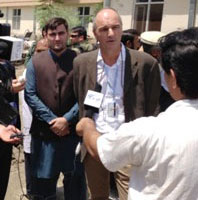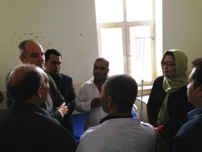 In his first week in office, Dr Rik Peeperkorn, WHO Representative for Afghanistan, is interviewed by local media on WHO's response to the floods and its support to the Government of Afghanistan On 3 August, heavy rains resulted in flash floods and high levels of water in 17 villages in the Surobi district of Kabul province, which affected 519 families, destroyed 458 homes, left 30 dead, and resulted in 22 missing people, as well as causing a significant amount of damaged agricultural fields and contaminated water wells.
In his first week in office, Dr Rik Peeperkorn, WHO Representative for Afghanistan, is interviewed by local media on WHO's response to the floods and its support to the Government of Afghanistan On 3 August, heavy rains resulted in flash floods and high levels of water in 17 villages in the Surobi district of Kabul province, which affected 519 families, destroyed 458 homes, left 30 dead, and resulted in 22 missing people, as well as causing a significant amount of damaged agricultural fields and contaminated water wells.
On 11 August 2013, a follow-up joint visit was conducted by HE Dr Suraya Dalil, Minister of Public Health of Afghanistan, Dr Rik Peeperkorn, WHO Representative for Afghanistan, and the emergency response team of the Ministry of Public Health and WHO with local health authorities and community leaders to assess the situation of affected communities and the capabilities of health facilities to respond.
The team also met with female community volunteers who provided service to the households with face-to-face education on hygiene and water chlorination to prevent waterborne diseases. The visit was followed by a press conference on the flood situation.
WHO conducted the post-disaster detailed assessment and provided one supplementary and three basic interagency emergency health kits for 13 000 people for three months and will continue monitoring the situation and response to the need for essential medical supplies, rehabilitation of damaged health facilities, functionalization of the operating theatre and therapeutic feeding unit, as well as training surgical staff of the hospital in trauma management.
 Minister of Public Health, HE Dr Suraya Dalil, and Dr Rik Peeperkorn, WHO Representative, discuss with the emergency response team, local health authorities and community leaders the response to the flash floods in Afghanistan which have left more than 30 people dead and 22 missing
Minister of Public Health, HE Dr Suraya Dalil, and Dr Rik Peeperkorn, WHO Representative, discuss with the emergency response team, local health authorities and community leaders the response to the flash floods in Afghanistan which have left more than 30 people dead and 22 missing


